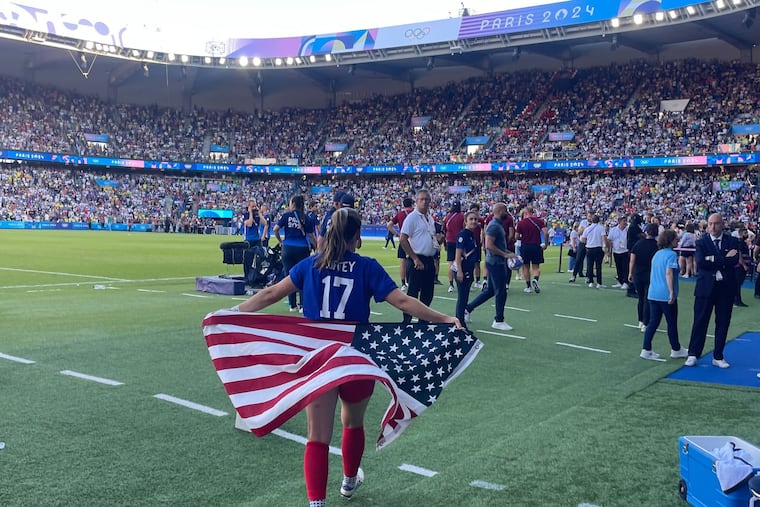U.S. women’s team is playing with joy again, and so is my sister. Watch out, world.
Sam Coffey, even at age 6, has always just loved the game. The difference now is that her passion for the sport is helping to usher in a new era of U.S. women’s soccer.

PARIS — On Saturday afternoon, my brother Sean and I stood along the fence at Parc des Princes, dehydrated and jet-lagged, waving our arms frantically while shouting our sister’s name. One thing they don’t tell you about having a family member in the Olympics is how much time you’ll spend trying to get their attention. There are no credentials to identify you as a sibling. Security was about to kick us out.
But at the last moment, we caught her eye. Sam Coffey — not just our little sister, but an Olympic gold medalist — jogged over and collapsed into my brother’s arms. I collapsed on top of them. We didn’t say anything. We just hugged and cried.
That moment made everything worth it. The flurry of time zones crossed, the 12-hour plane ride, the thousands of dollars spent returning to France. “What is happening right now?” she asked shortly after the U.S. defeated Brazil, 1-0, to win gold. We didn’t have any answers. My brother gave her an American flag, which she draped around her shoulders, and she was off.
Sam has played on the U.S. women’s national soccer team on and off since 2022. Her journey has not always been smooth. She was respected, but never given a full chance. It was difficult for her to compete for roster spots and playing time among more veteran players.
But that changed this year. Sam became a regular in friendlies and international tournaments, and in June, she was named to the Olympic team. At first, I wasn’t sure how long a trip to book, and to be honest, I don’t think anyone knew what to expect. The program was very much in transition. It had younger players, many of them playing in the Olympics for the first time, and a new coach in Emma Hayes, who had been training with them for only about two months.
None of that seemed too promising, but when I watched them play, it all made sense. In last year’s World Cup, they looked tight and mechanical. The expectations of suiting up for the United States seemed to weigh on the players.
Not anymore. This team plays with joy. It plays freely. It is unburdened by rankings and projections, and it shows. Hayes coaches to the players’ strengths, and on Saturday, they presented her with the ultimate reward: U.S. women’s soccer’s first gold medal since 2012.
For the last few years, my sister’s place in this program has been tenuous. She was invited to the pre-World Cup training camp in New Zealand last January but didn’t play a single minute. I wondered why they even bothered to invite her. It felt needlessly cruel to bring a young woman halfway across the world only to sit her.
But Sam, in typical Sam fashion, took it in stride. She said she learned from watching her teammates, and was grateful for the experience. A few months later, she was left off the roster. Instead of sulking, she focused on refining her defense. She watched from home as the U.S. women lost in the quarterfinals — their earliest World Cup exit ever.
I remember talking to her on the phone shortly after. There was no glee on the other line. If anything, there was sadness. She felt for her friends. She wanted to help them.
And this year, she did. This tournament has been surprisingly sweet for so many reasons, but above all, because Sam has played a pivotal role. Her position — defensive midfield — was perhaps the biggest question mark for the U.S. women this year. Julie Ertz’s absence left a gaping hole, one that had not yet been filled. Now, my sister is filling it, and she has made a real difference.
That difference doesn’t always show up in stat sheets. When Sam is at her best, you barely notice she’s there. Her job is to set up others for success. It’s cleaning up messes and doing the dirty work. But that doesn’t mean she isn’t important.
» READ MORE: Sielski: Ranking our top 10 moments and stories from the U.S. in the Paris Olympics
Hayes sees her value. From the moment she was hired, in November, she has made my sister feel secure. Sam didn’t have to beg for a spot on the team, or persuade Hayes to play her. Hayes saw potential and gave her an opportunity, one that she will never take for granted.
It’s why she closes her eyes during the anthem, and takes a knee on the grass before every game. She wants to soak in every moment, and it’s hard to blame her. Sometimes, I think about all of those hours Sam spent dribbling in our basement, with her goal written cleanly in chalk on the cinder-block wall: “U.S.W.N.T.”
I think about the Alex Morgan poster over her bed, and the tenacity she showed on the field, even when she was as young as 6. Parents would ask what was wrong with her. “Nothing is wrong with my daughter,” my mother would tell them. “She just loves the ball.”
She still does. The difference now is that her love for the sport is helping to usher in a new era of U.S. women’s soccer. Like her teammates, Sam had something to prove in this tournament. But on Saturday, she proved it. She showed that she belongs. She made the doubters look foolish.
And when the final whistle blew, they weren’t on her mind. She sprinted toward her friends with her arms wide open and a beaming grin across her face. Her joy was their joy, and their joy was her joy — a team reborn in Paris, France.